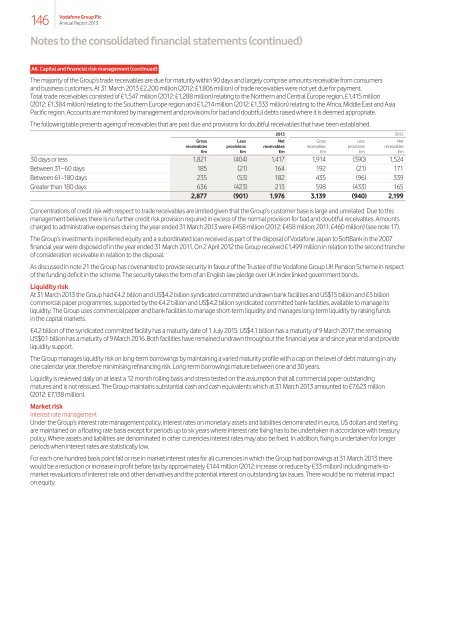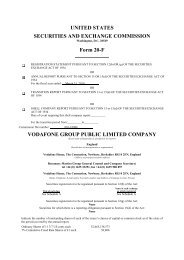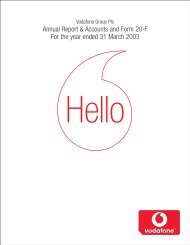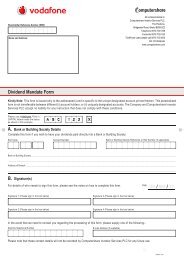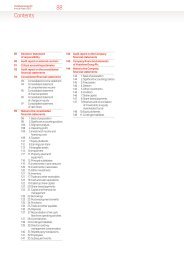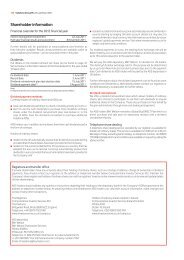The way ahead? - Vodafone
The way ahead? - Vodafone
The way ahead? - Vodafone
You also want an ePaper? Increase the reach of your titles
YUMPU automatically turns print PDFs into web optimized ePapers that Google loves.
146<br />
<strong>Vodafone</strong> Group Plc<br />
Annual Report 2013<br />
Notes to the consolidated financial statements (continued)<br />
A6. Capital and financial risk management (continued)<br />
<strong>The</strong> majority of the Group’s trade receivables are due for maturity within 90 days and largely comprise amounts receivable from consumers<br />
and business customers. At 31 March 2013 £2,200 million (2012: £1,806 million) of trade receivables were not yet due for payment.<br />
Total trade receivables consisted of £1,547 million (2012: £1,288 million) relating to the Northern and Central Europe region, £1,415 million<br />
(2012: £1,384 million) relating to the Southern Europe region and £1,214 million (2012: £1,333 million) relating to the Africa, Middle East and Asia<br />
Pacific region. Accounts are monitored by management and provisions for bad and doubtful debts raised where it is deemed appropriate.<br />
<strong>The</strong> following table presents ageing of receivables that are past due and provisions for doubtful receivables that have been established.<br />
Gross<br />
receivables<br />
Less<br />
provisions<br />
2013 2012<br />
Net<br />
Gross<br />
Less<br />
Net<br />
receivables<br />
receivables<br />
provisions<br />
receivables<br />
£m £m £m £m £m £m<br />
30 days or less 1,821 (404) 1,417 1,914 (390) 1,524<br />
Between 31–60 days 185 (21) 164 192 (21) 171<br />
Between 61–180 days 235 (53) 182 435 (96) 339<br />
Greater than 180 days 636 (423) 213 598 (433) 165<br />
2,877 (901) 1,976 3,139 (940) 2,199<br />
Concentrations of credit risk with respect to trade receivables are limited given that the Group’s customer base is large and unrelated. Due to this<br />
management believes there is no further credit risk provision required in excess of the normal provision for bad and doubtful receivables. Amounts<br />
charged to administrative expenses during the year ended 31 March 2013 were £458 million (2012: £458 million; 2011: £460 million) (see note 17).<br />
<strong>The</strong> Group’s investments in preferred equity and a subordinated loan received as part of the disposal of <strong>Vodafone</strong> Japan to SoftBank in the 2007<br />
financial year were disposed of in the year ended 31 March 2011. On 2 April 2012 the Group received £1,499 million in relation to the second tranche<br />
of consideration receivable in relation to the disposal.<br />
As discussed in note 21 the Group has covenanted to provide security in favour of the Trustee of the <strong>Vodafone</strong> Group UK Pension Scheme in respect<br />
of the funding deficit in the scheme. <strong>The</strong> security takes the form of an English law pledge over UK index linked government bonds.<br />
Liquidity risk<br />
At 31 March 2013 the Group had €4.2 billion and US$4.2 billion syndicated committed undrawn bank facilities and US$15 billion and £5 billion<br />
commercial paper programmes, supported by the €4.2 billion and US$4.2 billion syndicated committed bank facilities, available to manage its<br />
liquidity. <strong>The</strong> Group uses commercial paper and bank facilities to manage short-term liquidity and manages long-term liquidity by raising funds<br />
in the capital markets.<br />
€4.2 billion of the syndicated committed facility has a maturity date of 1 July 2015. US$4.1 billion has a maturity of 9 March 2017; the remaining<br />
US$0.1 billion has a maturity of 9 March 2016. Both facilities have remained undrawn throughout the financial year and since year end and provide<br />
liquidity support.<br />
<strong>The</strong> Group manages liquidity risk on long-term borrowings by maintaining a varied maturity profile with a cap on the level of debt maturing in any<br />
one calendar year, therefore minimising refinancing risk. Long-term borrowings mature between one and 30 years.<br />
Liquidity is reviewed daily on at least a 12 month rolling basis and stress tested on the assumption that all commercial paper outstanding<br />
matures and is not reissued. <strong>The</strong> Group maintains substantial cash and cash equivalents which at 31 March 2013 amounted to £7,623 million<br />
(2012: £7,138 million).<br />
Market risk<br />
Interest rate management<br />
Under the Group’s interest rate management policy, interest rates on monetary assets and liabilities denominated in euros, US dollars and sterling<br />
are maintained on a floating rate basis except for periods up to six years where interest rate fixing has to be undertaken in accordance with treasury<br />
policy. Where assets and liabilities are denominated in other currencies interest rates may also be fixed. In addition, fixing is undertaken for longer<br />
periods when interest rates are statistically low.<br />
For each one hundred basis point fall or rise in market interest rates for all currencies in which the Group had borrowings at 31 March 2013 there<br />
would be a reduction or increase in profit before tax by approximately £144 million (2012: increase or reduce by £33 million) including mark-tomarket<br />
revaluations of interest rate and other derivatives and the potential interest on outstanding tax issues. <strong>The</strong>re would be no material impact<br />
on equity.


